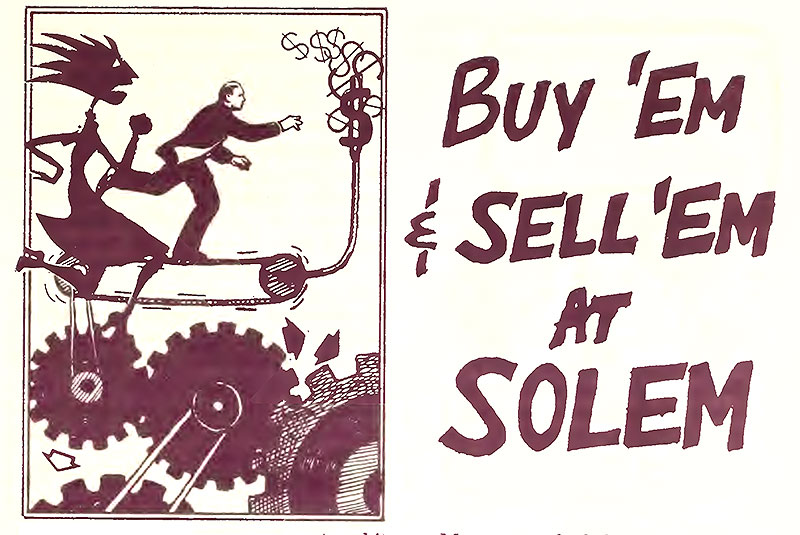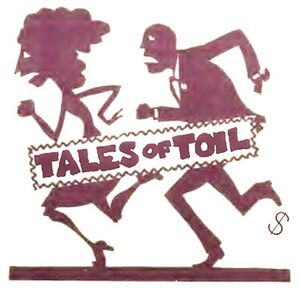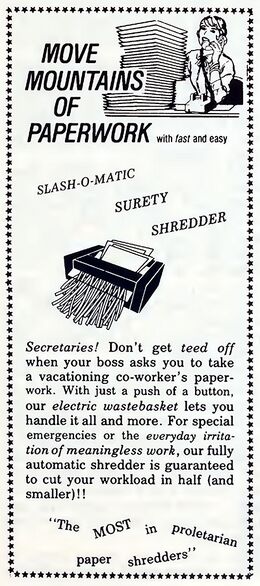Buy 'Em and Sell 'Em at Solem
"I was there..."
- "Foundsf.org is republishing a series of "Tales of Toil" that appeared in Processed World magazine between 1981 and 2004. As first-hand accounts of what it was like working at various jobs during those years, these accounts provide a unique view into an aspect of labor history rarely archived, or shared.
by Helen Highwater
—from Processed World #6, published in Winter 1983.
Once again my money ran out and it was time to end another glorious bout of unemployment. It took 5 or 6 interviews, but just when I was beginning to believe those screaming headlines of economic doom, I scored a job at an advertising/public relations firm. Welcome aboard.
Ah, the illustrious Solem Associates (a.k.a. Hype, Inc.), nestled on the edge of the Tenderloin. I would spend the next four months here entangled in the illogic of doublethink and plain old-fashioned lies and absurdities.
Solem Associates survives through political connections. Mr. and Mrs. Hype and many of the ever-eager Hype Associates are close pals with S.F.'s own Lady Di and other liberal party hacks. Solem specializes in anti-rent control campaigns. The financial backing of local real estate interests enables Solem to assume one of its many disguises, "Citizens for Fair Housing," which in turn allows them to produce tons of glossy literature to convince "citizens" that affordable housing, tenant security, and an end to bureaucracy await those who vote against rent control.
Most recently Solem has been busy saving S.F. from municipalized electricity. They also run two relatively benign state-funded projects. Half the staff works on The War Against Waste! This consists of taking photos of a man in a "Wasteless Willie" bear costume and mailing tons of "Wasteless Willie" literature to unsuspecting citizens. Solem and "Wasteless Willie" produced and discarded due to mistakes or because the literature was outdated—a truly obscene amount of paper.
My job was project secretary and chief flunky for the "Family Communication Program." With a million bucks from the State of California, Solem Associates spewed forth yet more glossy literature and a half dozen annoying radio and TV commercials. The object? To stop teen pregnancies. "The unique aspect of this program," Mrs. Hype proudly announced "is that it has no content!" The million dollars (spent at a time when community health clinics and other direct service agencies are screaming for funds) was merely to convince parents to talk to their kids about sex, and not, of course, to promote contraceptive use or to encourage responsible attitudes towards sexual activity. This would have been much too controversial.
The "Teens Please Don't Fuck" program employed 20 people and was heavy on tokenism. Before the field staff was hired, I overheard the bosses musing, "Well, we've got one Asian, we could use one Japanese ... we've got two Blacks, how about another Black and another Hispanic..." Once the proper racial/ethnic blend was selected, these 14 troopers contacted community groups and encouraged them to sponsor workshops on parent communication—which hardly anyone would attend. These workshops, plus the program literature and media advertisements, were our product and my daily work. While the actual content of my job was absurd, the work itself was strictly secondary to the exciting terrains of office politics and office social life.
What kind of people are attracted to advertising/public relations? The prime mark of a Solem-lifer was that, although they might bitch and moan about the task at hand, deep down they believed in what they were doing, or at least believed in the possibility of an exciting career in public relations.
I sat in a cubicle surrounded by a four-foot partition and watched over by the mandatory flickering fluorescent lights. There was not a real wall to be found in the entire office. The partitions gave the illusion of privacy, but attentive ears in adjacent cubicles assured the rapid spread of gossip. Through scraps of conversation floating into my unit I quickly identified all the office types. Like the Most Creative Man in S.F., or so he believed when buzzed on coke which was most of the time. Or the Office Spy who stared hawk-like into all the cubicles, ever vigilant for any infraction of rules. Once he discovered someone using the postage meter to mail a letter to her mother and deducted $.20 from her paycheck.
A curious aspect of Solem Associates was that for the most part my four supervisors were so wrapped up in the details of their various projects that they rarely noticed what I was up to. As long as I delivered a minimum amount of work which met their loosely defined standards of professionalism they left me alone.
On the other hand, the abundant "support staffers" were eager to step into supervisory roles. Even with the obliviousness of my bosses, I still found it necessary to try to hide the many little ways I ignored the rules and procedures and to cover up any of my mistakes. It took me a long time to understand that I really could not trust most of my coworkers. And in the meantime, I nearly lost my job by confiding too much about my political beliefs and my very critical attitude towards wage labor.
"Chatty Kathy" sat in the cubicle next to me: she loved her job as a secretary and talked in an excruciatingly loud voice about the endless details of each little task. "Chatty Kathy" also loved to play snoopervisor and was responsible for firing two clerical workers. Chatty discovered that one woman who had claimed a family emergency was actually on vacation, so of course Chatty ran to Office Spy who was more than happy to bump her from the payroll. Chatty's second victim was a single mother who sometimes came in late when she had to take care of her son. Chatty thought her commitment to something or somebody outside work was very unprofessional and used her influence to get her fired.
Along with the vicious maneuvering for power and prestige was an exaggerated superficial friendliness. One minute my "cell mate" would give someone the finger behind their back, and the next she would exclaim (to the same person) "Oh, you're the greatest!"
Solem Associates was going bust. They lost contract after contract. The candidate they promoted in the democratic primary lost big. Each new defeat meant a few more layoffs. The remaining people became more frantic about continually proving their worth, primarily by trying to point out other people's lack of worth. While the failure of the firm was on every one's mind, it was never the subject of open conversation—just whispers in the corridor about who would be the next to go.
Money for the "Hey Don't Fuck" program ran out and to my immense joy and relief I was laid off. Now I'm safely on unemployment and wonder ing how long I can stretch it before once again I'11 be compelled to enter what so many people think of as the real world.




